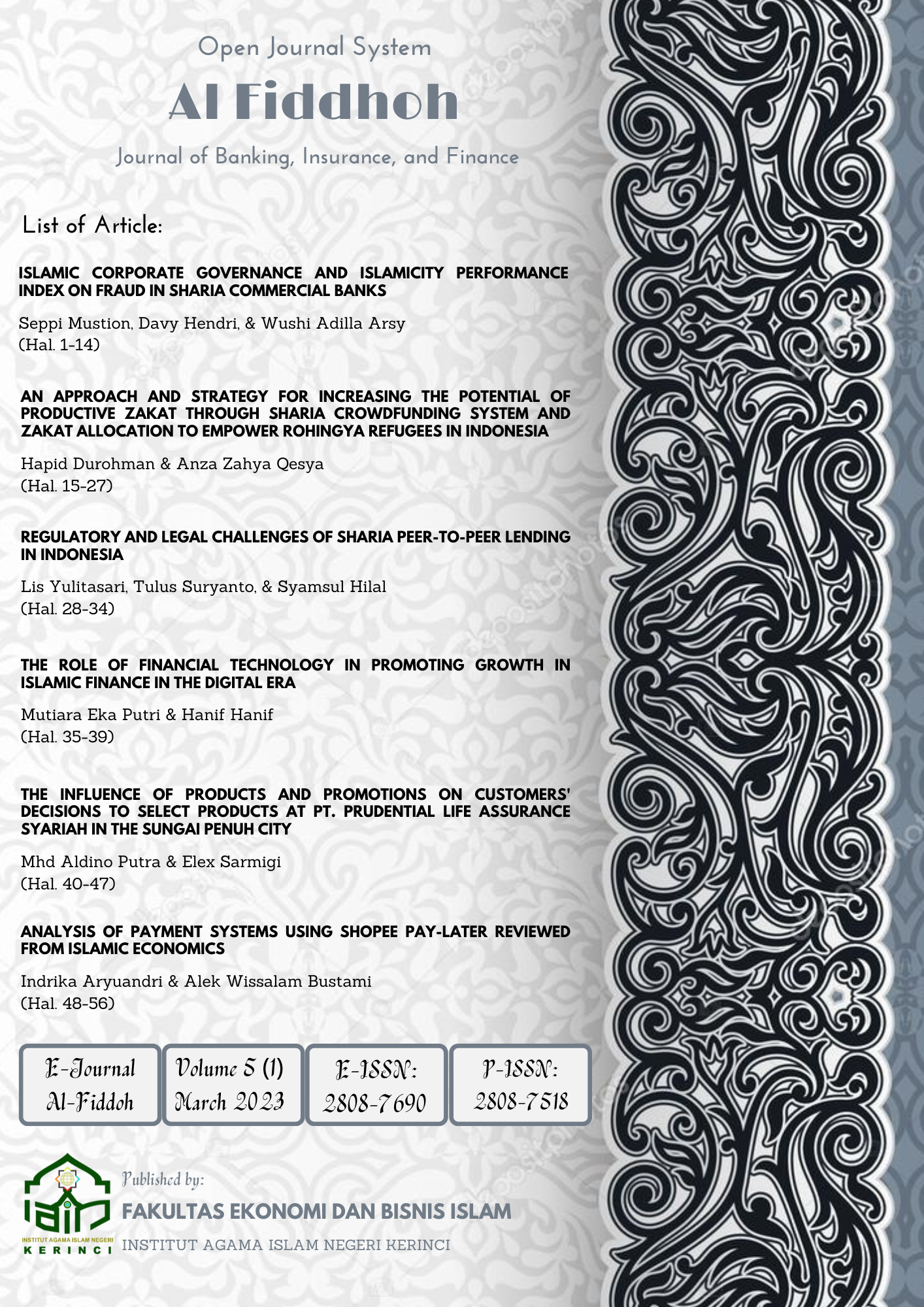THE ROLE OF FINANCIAL TECHNOLOGY IN PROMOTING GROWTH IN ISLAMIC FINANCE IN THE DIGITAL ERA
Abstract
Financial technology (fintech) has increased and can potentially drive Sharia finance's growth. This study aims to analyze fintech's role in promoting Islamic finance's growth in the digital era. The research method uses a literature study. A descriptive analysis approach involves breaking secondary data in journals, articles, and statistical reports related to the research topic. The results of this study indicate that the adoption of fintech in Sharia finance is predicted to continue to increase, driven by the millennial Muslim population. Fintech provides opportunities for Sharia financial product innovation. However, the challenges of developing Sharia fintech are significant and related to regulations, compliance risk, and human resources. Some examples of Sharia fintech platforms, such as P2P lending and equity crowdfunding, have been quite successful. The prospects for sharia fintech in Indonesia are positive with the support of digital infrastructure and the millennial Muslim population. Regulatory support is needed so that Sharia fintech is truly compliant and can drive the growth of Islamic finance. Sharia fintech has the potential to be a game changer for the development of Islamic finance in Indonesia. Comprehensive support from regulators and stakeholders can realize the optimal implementation of Sharia fintech for inclusive and sustainable Sharia finance expansion.
Downloads
References
Abdalla, M.M. and Basah, M.Y.A. (2021). Fintech in Islamic Finance: A Review of Challenges and Prospects. International Journal of Economics and Management, Accounting, 29(2).
Adhitya Wulanata, I. (2017). Analisis SWOT Implementasi Teknologi Finansial Terhadap Kualitas Layanan Perbankan di Indonesia. Jurnal Ekonomi Dan Bisnis, 20(1), 133–144. https://core.ac.uk/download/pdf/190864220.pdf
Agustiningsih, Maulida Dwi, Ravika Mutiara Savitrah, and P. C., & Lestari., A. (2021). “Indonesian young consumers’ intention to donate using sharia Fintech.”. Asian Journal of Islamic Management, 3(1), 34-44.
Ahmed, Mezbah Uddin, and K. M. T. (2021). “The Opportunities of Digital Wallets from an Islamic Perspective.” 267–279.
Antonio, M.S., Rusydiana, A.S., Laila, N., Huda, N., & Marlina, L. (2020). Harnessing the potential of financial technology in Islamic finance. Qualitative Research in Financial Markets. https://doi.org/10.1108/QRFM-02-2019-0017
Asosiasi Penyelenggara Jasa Internet Indonesia (APJII). (2023). "Survei APJII pengguna internet di indonesia ". https://apjii.or.id/berita/d/survei-apjii-pengguna-internet-di-indonesia-tembus-215-juta-orang
Aulia, Mahdiah, Aulia Fitria Yustiardhi, and R. O. P. (2020). "An overview of Indonesian regulatory framework on Islamic financial technology (fintech). Jurnal Ekonomi & Keuangan Islam, 64–75.
Baber, H. (2019). “Financial inclusion and Fintech: A comparative study of countries following Islamic finance and conventional finance. ” Qualitative Research in Financial Markets .
Gani, A. G. (2014). Pengenalan Teknologi Internet Serta Dampaknya. Jurnal Sistem Informasi Universitas Suryadarma, 2(2). https://doi.org/10.35968/jsi.v2i2.49
Glavina, Sofia G., Irina A. Aidrus, and A. A. T. (n.d.). “Assessment of the Competitiveness of Iplementation of Ilamic Financial Technologies. ” In Proceedings of the International Conference Digital Age: Traditions, Modernity and Innovations (ICDATMI 2020), 191-197. https://dx.doi.org/10.2991/
Haddad, C. and Hornuf, L., 2019. (2019). The emergence of the global fintech market: Economic and technological determinants. Small Business Economics, 53(1), 81–105.
Hasan, Rashedul, Mohammad Kabir Hassan, and S. A. (2020). “Fintech and Islamic finance: literature review and research agenda.” International Journal of Islamic Economics and Finance (IJIEF), 3(1), 75–94. https://doi.org/10.18196/ijief.2122
Irawan, F. (2021). RELEVANSI FINANCIAL TECHNOLOGY DI TINJAU DARI PERSPEKTIF EKONOMI SYARI’AH: Relevansi Financial Technology Di Tinjau Dari Perspektif Ekonomi …. AL-Bayan: Jurnal Hukum Dan Ekonomi Islam, 6469, 50–75. http://jurnal.stainwsamawa.ac.id/index.php/al-bayan/article/view/18
Khudhori, K. U., & Hendri, L. (2021). Islamic Banking and Fintech: Sustainable Collaboration. Al-Intaj : Jurnal Ekonomi Dan Perbankan Syariah, 7(2), 172. https://doi.org/10.29300/aij.v7i2.4881
Lajis, S. M. (2019). “Fintech and risk-sharing: a catalyst for Islamic finance". In Islamic Finance, Risk-Sharing and Macroeconomic Stability, 237–254.
Laldin, Mohamad Akram, and F. D. (2019). “Islamic finance in the digital world: Opportunities and challenges (Kewangan Islam dalam Dunia Digital: Peluang dan Cabaran). ” Journal of Islam in Asia", 16(3), 283–299. https://doi.org/10.31436/jia.v16i3.853
Malaysia International Islamic Financial Centre. (2018). Fintech in Islamic Finance: Enabling Distinct Opportunities.
Muneeza, Aishath, and Z. M. (2021). “Islamic Fintech and financial inclusion.” In Islamic Fintech, 173–190. https://doi.org/10.1007/978-3-030-45827-0_10
Narastri, M. (2020). “Financial technology (Fintech) di Indonesia ditinjau dari perspektif Islam". ” Indonesian Interdisciplinary Journal of Sharia Economics (IIJSE) 2, 2, 155–170. https://doi.org/10.31538/%0Aiijse.v2i2.513
Naution, D. A., Hasibuan, R. R. A., & Prayoga, R. (2021). Tingkat Perkembangan Fintech (Financial Technology), Pemahaman Fintech (Financial Technology) dan Minat Mahasiswa UIN Sumatera Utara. Jurnal Pendidikan Tambusai, 5(3), 9080–9090. https://jptam.org/index.php/jptam/article/view/2423
Nizar, M. A. (2020). Financial Technology ( Fintech ): It ’ s Concept and Implementation in Indonesia. Munich Personal RePEc Archive, 5(98486), 4–10.
Noor, S.M. and Muideen, P.M. (2019). Fintech in Islamic finance: A user perspective in Malaysia. Review of Islamic Economics, 13(2), 139–167.
Nurfadilah, Dety, and S. S. (2021). “How The Covid-19 Crisis Is Affecting Customers’intention To Use Islamic Fintech Services: Evidence From Indonesia.” Ournal of Islamic Monetary Economics and Finance, 83–114.
Rani, N. F. A., Seman, A. C., Rahman, A. A., & Z’aba, M. R. (2021). A View Point Of Islamic Financial Technology (I-Fintech) In Malaysia. Labuan E-Journal of Muamalat and Society, 15, 97–110. 15
Sudirman, L., & Disemadi, H. S. (2022). Titik Lemah Industri Keuangan Fintech di Indonesia: Kajian Perbandingan Hukum. Jurnal Pembangunan Hukum Indonesia, 4(3), 471–493. https://doi.org/10.14710/jphi.v4i3.471-493











